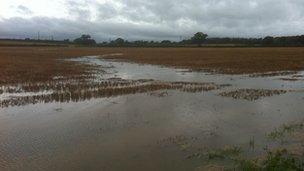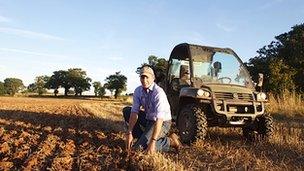Farmer says 2012 'the worst harvest in my lifetime'
- Published

Mr Payne says much of next year's crop is already under water
Record-breaking wet weather has damaged food production and led to poor crop yields across the UK - with experts warning of soaring food prices and worsening global conditions.
The strain on British farmers means productivity is down to 1980s levels, according to the National Farmers' Union (NFU).
Arable farmer Richard Payne, 49, from Taunton in Somerset, told BBC News his harvest has been so seriously affected that it could threaten his farm's future altogether.
"As a farmer, this has been the worst harvest in my lifetime. And my father, who is 83, says it is the worst he has ever seen.
"The fact that last year was our best and this year the worst makes it even harder to take."
Business has been "seriously affected" by the weather, adds Mr Payne.
"Our 10-year average for wheat has been 3.8 tonnes per acre. In 2011, we achieved a 4.8 tonne crop, and for 2012, it has shrunk to well below three tonnes per acre.
"If it's one year, we can just about get out of it, but beyond that we are facing serious problems. It will become increasingly hard to continue at all."
And beyond that, farmers are under enormous pressure over prices.
"For supermarkets, food prices must be kept down, at all costs, for the consumer. But because farming is such a long cycle there is little account taken of retrospective costs for the producer.
"For example, I've spent about £30,000 on my rape seed crop already - in seeds, cultivations, slug pellets - and that's just the cost. It could all fail.
"I used to be in beef, but we were screwed to the floor by retailers. It didn't matter what costs you had, they didn't care. I had to get out of it.
"Looking back 25 years ago, British people probably spent about 22% of their disposable income on food. Now we spend roughly between 4 and 8%, so food has actually become cheaper.
"But people don't realise that the 'bog-offs' - the buy-one-get-one-free deals as we call them - are not actually sponsored by supermarkets. They are paid for by the producer who has to agree to them under tight terms and conditions.

Although last year was better than most, Mr Payne says his farm has lost money for the past 15 years
"I don't think food production is properly taught in school anymore and many don't realise how fragile the whole system is.
"Some people have a jaundiced view that prices are rising and going into the pocket of the farmers. That's just not the case.
"I have lost money for the last 15 years - making a bit in the last two - but margins are always extremely tight. If we make a less than quality crop then we lose money."
And the outlook is not improving, he warns.
"What is more worrying is the fact that, in my view, next year's harvest has already been compromised. We are now on the back foot.
"Fields ready for wheat planting are under water, and those that have been planted are being eaten by slugs, or killed off by water logging.
"Most of my oil seed rape crop is struggling likewise, and there is no guarantee that it will survive the winter because it is so backward. Winter will take out a percentage of the plants.
"If this pattern of wet weather continues, we will be in for a very small harvest in 2013.
"The danger is - at some stage - farmers will say, 'is it really worth me even growing these crops?' Food will have to be imported from elsewhere.
"So it's pretty much doom and gloom in the South West."
- Published10 October 2012
- Published4 October 2012
- Published10 August 2012
- Published10 October 2012
- Published12 June 2012